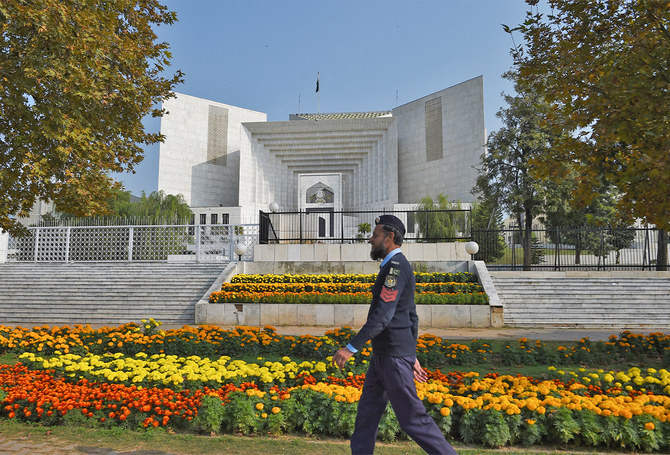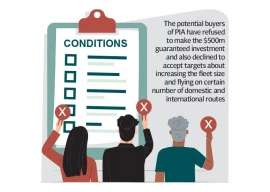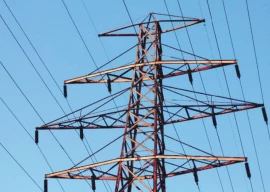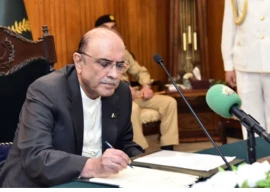
PTI chief Imran Khan has decided to approach the courts for the inquiry to bring to light those responsible for the bugging of the Prime Minister Office (PMO). However, if history offers any indication, the Supreme Court has for the last three decades only raised its eyebrows when it sniffs out surveillance operations in the courtrooms against judges.
Legal experts point out that the covert surveillance by agencies that allegedly keep tabs on lawmakers and politicians has rarely elicited alarm from the courts.
The back-to-back audio leaks rang alarm bells in the corridors of power, with the opposition – mainly PTI – raising questions about flaws in the cyber security of the highest office of the land.
In a series of tweets today, Imran said: “The audio leaks are a serious breach of national security as they call into question the entire security of the PMO, PMH. As the prime minister, my secure line at my residence was also bugged.
“We intend to go to court to establish the authenticity of leaks and then form JIT to investigate which intelligence agency is responsible for the bugging and who is leaking out the audios, many of which are edited/doctored,” Imran said.
It was also learnt on Monday that PTI has decided to approach the top court. The petition will be filed through lawyer Uzair Karamat Bhandari.
In 1996, the then chief justice Sajjad Ali Shah took notice of the recording of phone calls by intelligence agencies after a spying device was found connected to his phone.
Later, former president (late) Farooq Ahmed Leghari’s counsel – during the Benazir Bhutto dismissal case proceedings – cited before the Supreme Court phone tapping of judges by the Benazir regime as a major justification for her government’s ouster.
In 2015, a three-judge bench of the apex court led by ex-CJP Mian Saqib Nisar resumed hearing of the case. The top court sought a reply from the federal government regarding the law under which phone calls are tapped by intelligence agencies.
On June 3, 2015, the ISI requested the apex court to hold in-camera proceedings of the suo motu case. Subsequently, the bench accepted the plea and the matter was fixed in the chamber. However, the case is still pending in the apex court.
During the hearing of ex-CJP Iftikhar Muhammad Chaudhry's case in 2007, the apex court passed directions regarding the surveillance of judges.
The larger bench, led by Justice Khalil ur Rehman Ramday on July 2, 2007, banned the unauthorised access to intelligence operatives inside superior courts’ offices, and also instructed the director-general of the Intelligence Bureau to sweep the Supreme Court and residences of all judges for bugging devices.
At the same time, the court had asked the IB chief to file a sworn affidavit that such premises have been cleared of all such bugging gadgets in a week.
The matter regarding surveillance was again raised by Justice Qazi Faez Isa in his case in 2019. Interestingly, the PTI was in power at the time.
In October 2019, Justice Isa offered to submit a sealed affidavit explaining how he knew that a surveillance operation was carried out on him and his family. The offer was made on the judge's behalf by his attorney, Muneer A Malik before the 10-judge full court, led by Justice Umar Ata Bandial.
It elicited a strong response from then-Attorney General of Pakistan Anwar Mansoor Khan who strongly objected to the submission of any such document.
The AGP said the apex court, under Article 184 (3) of the Constitution, cannot record evidence.
Later, Justice Isa contended that the information gathered against him and his family to file a presidential reference was collected through “covert surveillance” by using “unlawful means”.
“Surveillance of a judge and his family is not envisaged under this law, therefore, all those who did so are now liable for criminal prosecution which this court may be graciously pleased to order,” stated Justice Isa in his written synopsis submitted in the apex court in February 2020.
However, the majority judgment authored by Justice Bandial rejected Justice Isa's allegation about the surveillance of his family members, noting that surveillance primarily involves the monitoring or recording of a person’s movements, conversations or other activities and communication.
“However, in the present case the learned counsel for the petitioner has not produced any evidence before us which demonstrates that either the petitioner or his family has been monitored or their communications have been intercepted.”, says the judgment.
However, Justice Maqbool Baqar in his dissenting note had noted Respondents (PTI government) carried out covert surveillance of Justice Isa and his family without any rhyme or reason, wholly illegally, unauthorised and in violation of the law.
Justice Baqar noted Muneer A Malik had referred to the case of Mohtarma Benazir Bhutto (PLD 1998 SC 388), where a seven-member bench of the court held that covert surveillance of Judges by intelligence agencies was in and by itself a sufficient ground for the dissolution of a government.
The learned judges discussed in detail how covert surveillance violates the constitutional principle of judicial independence, as well as the right of dignity and privacy guaranteed under Article 14, and held it to be “direct interference in the independent functioning of the judiciary and is a grave violation of the principle of trichotomy of power".
It was further observed that surveillance is also contrary to the Islamic injunctions; in particular verse 12 of surah Al-Hujurat which reads, “O ye who believe! Avoid suspicion as much (as possible): for suspicion in some cases is a sin: and spy not on each other”, and that “[I]f a person intrudes into the privacy of any man, pries on private life, it injures the dignity of man, it violates the privacy of home, it disturbs the tranquillity of the family and above all, it puts such person to the serious danger of blackmail” and that the same is “wholly destructive of the independence of the judiciary”.
"The learned Judges proceeded to hold that the privacy of home mentioned in Article 14, could not be restrictively defined to apply to the home alone but signified the citizen’s right to privacy wherever he lived or worked and even in public places. It was ordered that until such time as a proper law was framed in this regard, no tapping or eavesdropping of any person should take place without the permission of this court or a commission formed by it.
It was further held that “If the executive interferes with the judiciary in any manner… [i]f the privacy of the judges and their communications are not ensured, then it is not possible for them to discharge their duties in the manner envisaged and mandated by the Constitution”.
Justice Baqar said that twenty-two years have passed since this judgment but it continued to be disregarded. Such disregard is at the nation’s peril, destructive of the judiciary’s independence and is a negation of the Constitution.
SC judge said that in a civilised democratic dispensation, where the dignity of man, and his privacy, has been secured by a written constitution inviolably, covert surveillance is an anathema, and is extremely reprehensible. However because of the strong wave of terrorism that engulfed this country as a consequence of the so-called Afghan war, posing threat to our very existence, and in order to curb and control the same, it was felt necessary to allow covert surveillance, but keeping in view the intrusive and abrasive nature of such act, and in order to lay down a complete mechanism so that it be exercised very sparingly and in a well-regulated manner, leaving no room for the excessive, arbitrary or whimsical exercise of such power, a law was enacted by the name of Fair Trial Act, 2013 (the Act).
"The preamble to the Act recognizes the need to prevent our law enforcement and intelligence agencies, from using such power arbitrarily. In terms of the Act, covert surveillance can only be carried under a warrant issued by a high court. In order to obtain such warrant, the officer concerned, in terms of section 5 of the Act, is required to prepare a report in that regard supported by relevant material, and on the basis thereof to seek approval of the federal minister for interior, before making an application to the judge of the high court for issuance of surveillance warrant, whereas in terms of section 8 of the Act, the application submitted to the High Court Judge, is required to be supported by an affidavit of the authorized officer, to the effect that the contents of the report and the application are true and correct and that the warrant sought shall be used only and exclusively for preventing or lawfully investigating the schedule offence or to collect evidence in support thereof, and further that the same shall neither be misused in any manner nor shall the approval of the warrant be abused to interfere or intervene in the privacy of any person.
"Sub-clause (2) of Section 10 of the Act, inter alia, provides that the Judge while passing the order for issuance of a warrant shall ensure that (a) the authorized officer is properly authorized to represent the applicant agency; and (b) the issuance of the warrant shall not unduly interfere in the privacy of any person or property. Whereas section 15 of the Act prescribes that where a Judge is of the view that any request for the issuance of a warrant is based on insufficient or irrelevant considerations and has resulted in undue and inappropriate interference in the privacy of any person, or that the material and information collected, or received under the warrant, show that the officer concerned did not apply himself fully while making an application for the warrant, then he may recommend departmental action against the officer concerned. In terms of section 27 of the Act, a review committee comprising ministers of defence, interior and law, are, on a six-monthly basis, required to call for reports from all the applicants about the warrants obtained by them and assess as whether the evidence collected pursuant to the warrant of surveillance, or interception, has been helpful in the prevention of offences and of aid to prosecution or has been able to achieve the object and purposes of the Act.”
"The above review and analysis clearly show that even in cases of terrorism, covert surveillance, cannot be exercised without the permission of authority as high as a high court judge and that for obtaining such permission the officer concerned has to make out a strong case, justifying the same. The application and report prior to its submission before the high court has to be approved by the minister of interior, and all care and caution are to be exercised to ensure and demonstrate that not only the surveillance is inevitable but also that the same shall not be misused. Very rigorous and stringent conditions are attached to the permission/warrant for surveillance so that the same may not be executed whimsically, and may not be exploited for any unrelated purposes.
"The above also shows that our lawmakers are highly conscious of the fact of how damaging intrusive and abrasive covert surveillance may prove and therefore the relevant law itself discourages and makes it very difficult to obtain permission for the same through the various provisions/requirement noted above. However, the respondents have violated all of the above and carried out covert surveillance of the Petitioner and his family without any rhyme or reason, wholly illegally, unauthorisedly and in violation of the law and fundamental rights of the petitioner (Justice Isa) and his family, secured by our Constitution", says Justice Baqar in his dissenting note.




1725797067-0/Untitled-design-(6)1725797067-0-165x106.webp)







1665464117-0/image-(2)1665464117-0-270x192.webp)


1665154877-0/2383264-cypher-1665152324-806-640x480-(1)1665154877-0-270x192.webp)











COMMENTS
Comments are moderated and generally will be posted if they are on-topic and not abusive.
For more information, please see our Comments FAQ